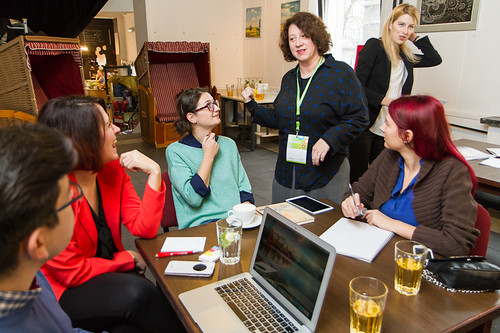 This year, or next year, I would love to create or co-create, and/or to deliver, an entire, semester-long course as a part-time or full-time instructor at a university or college, within any program that trains current or aspiring nonprofit managers, social workers, public sector workers, aid and humanitarian workers, etc. I would most like to do this onsite here in the greater Portland, Oregon metropolitan area, but I would welcome the opportunity to create and/or deliver an online course as well.
This year, or next year, I would love to create or co-create, and/or to deliver, an entire, semester-long course as a part-time or full-time instructor at a university or college, within any program that trains current or aspiring nonprofit managers, social workers, public sector workers, aid and humanitarian workers, etc. I would most like to do this onsite here in the greater Portland, Oregon metropolitan area, but I would welcome the opportunity to create and/or deliver an online course as well.
I have guest lectured many times at the university level, you can see my academic / research work at my profile on academia.edu, most of the academic articles that have cited my work regarding virtual volunteering are listed at my Google Scholar account., and I have done intensive trainings for thousands of people over the years. I think all of that qualifies me to create and/or deliver an intensive, practical, semester-long course at a university.
The courses I dream of creating and teaching:
- communications for mission-based initiatives (nonprofit organizations, public sector initiatives, etc.): basic public relations functions, press relations, outreach to particular audiences, strategic communications (systematic planning and utilization of a variety of information flows, internal and external to an organization or program, to deliver a message and build credibility or a brand), using traditional print, synchronous and asynchronous online / digital communications and emerging digital technologies effectively, integrating the use of all information flows, addressing socially or religiously-conservative audiences, crisis communications, how to address misinformation / misunderstandings, how to deal with public criticism, measuring success in communications, etc.
- community engagement / volunteer management for mission-based initiatives (nonprofit organizations, public sector initiatives, etc.): involving people from various local demographics as volunteers, from program supporters to advisers, and creating ways for the community to see the work of an organization firsthand. This would be beyond just a basic volunteer management 101 course that covers recruitment, data management, risk management, and other aspects of operational management.; it would also explore ethics, emerging innovations in volunteer engagement, building the capacity of the entire organization to involve volunteers, internal advocacy for volunteer engagement, volunteer engagement to directly support the organization’s mission, creating non-traditional opportunities for volunteers, etc.
How much do I want to do this? I’ve already written early drafts of those courses, with lesson plans and required reading outlined. Yes, that’s what I do in my spare time.
I enjoy teaching, and my goal in any training is to give participants tools that they can use immediately in their work, and to give students a base on which to further build and improve long after the class is over. Capacity-building is always central to any training or consulting work I do. Capacity-building means giving people the skills, information and other resources to most effectively and efficiently address an organization’s mission, and to help the organization be attractive to new and continuing support from donors, volunteers, community leaders and the general public.
I enjoy teaching, and I try to give my classes, online or onsite, a lively, participatory feel.
I have a profile at LinkedIn, as well as details on my own web site about my professional activities. I’m also happy to share my CV with you; email me with your request. If you have any specific questions about my profile, feel free to contact me as well. References available upon request as well.
And, of course, I’m still open to consulting. My consulting services are detailed here. I can deliver both onsite and online services. Also, I love to travel (especially internationally!).
Looking forward to hearing from any universities who might be interested! Questions welcomed!
